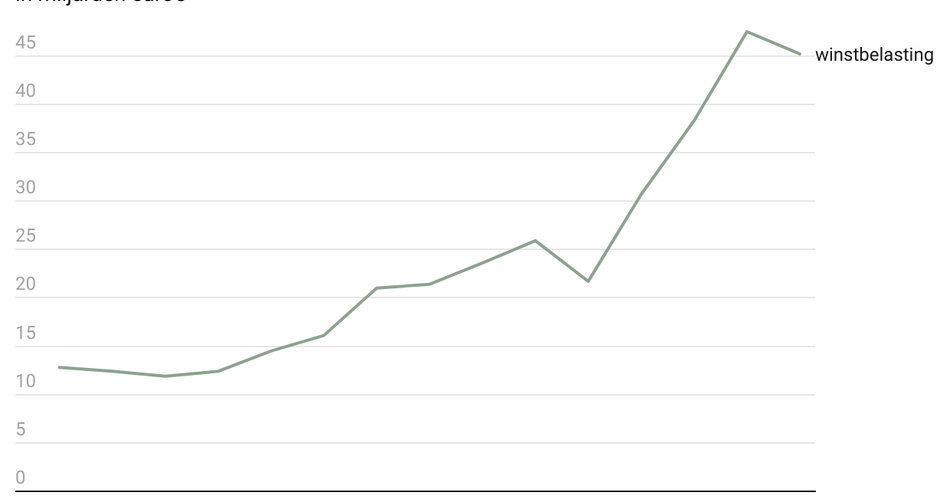After years of neglect, politicians are finally paying attention to the crumbling business climate. So will everything be all right now? That will be tricky. Because these same politicians have in recent years become addicted to appeasing their voters - with money from that same business community.
Nowhere is the split politicians find themselves in more evident than with the VVD, where party leader Dilan Yesilgöz and Finance Minister Eelco Heinen are pulling in opposite directions. According to party leader Yesilgöz, it is "code red" for the middle class. In the'agenda for working Holland' presented earlier this year, she wants to give the middle class 1 billion euros in tax relief and higher allowances.
Of course, this VVD sound is not new. Her predecessor as group chairman, Klaas Dijkhoff, already stated in 2019 that "the middle class is increasingly in trouble. He combined that with a slight distaste for multinationals. Those large companies did not shoot Prime Minister and VVD leader Mark Rutte in 2018 in the public discussion about abolishing the dividend tax. That caused a breach of trust between big business and its staunchest political ally the VVD.
Somehow that suited the VVD. Because to appease that middle class, money was needed. When Klaas Dijkhoff left the Binnenhof - he is now"busy with behavioral influencing" and podcaster - his successor Sophie Hermans took the lead in 2021 to rebuild the national budget in an evening after Prinsjesdag to make all kinds of political hobbyhorses possible. The business community was presented with the bill of 1.7 billion euros.
Traditionally, taxing corporations was a battle between left and right. The left was for, the right against. But as the VVD's "dike" broke, a tidal wave of tax increases for corporations ensued.
All in all, between 2018 and 2025, successive (center) right-wing cabinets with the VVD increased taxes for businesses by 13.5 billion euros, it turns out if you analyze figures from the Central Planning Bureau (from before 2018, the Planning Bureau has no figures). By contrast, during the same period, families received nearly 8 billion euros in tax cuts.
The chart above shows only the so-called "policy" tax changes - the knobs that politicians have actively turned. Of course, the government also gets more tax money when people get more wages, or companies make more profits. But even when you factor that in, you see that the profit tax rate has risen much faster. Between 2019 - the last "normal" year for corona - and 2024, companies paid 19.3 billion more in profit taxes, an increase of 74 percent. Payroll taxes rose relatively much less rapidly, by "only" 35 percent.
Appeasing the citizenry - whether you call it families, voters, or middle class - always comes at the expense of business. Of every euro the government spends, 10 cents is now paid for by corporate profit taxes, according to calculations by Hollands Welvaren based on CPb figures. The average over the past 25 years is 8 cents. At the same time, the contribution of payroll taxes to the welfare state actually fell by 2 cents, to 31 cents.
'You can't keep taxing companies indefinitely'
So VVD leader Yesilgöz's course is to make the middle class contribute even less to maintaining the welfare state - after all, it needs even more tax cuts. But she has a problem. After all, last year she put party colleague Eelco Heinen forward as finance minister. And he is on a very different course. We cannot continue 'infinitely taxing' companies, he said recently in the Lower House. 'The business climate is under pressure and I think we underestimate how fragile our prosperity is.' So as far as he is concerned, the money tap with which citizens have been spawned in recent years will be closed.
Suppose you wanted to improve the business climate by reducing the contribution of businesses to government spending to that long-term average of 8 percent, you would have to channel them some 10 billion euros toward business. That's 10 times more than Yesilgöz wants to free up to solve "code red" for the middle class. Serious money, in other words.
You could, of course, cut taxes for both voters and businesses. But then you either have to let the budget deficit increase or cut spending. And there are almost no plans for the latter in the Lower House. During the election campaign, parties mainly wanted to increase spending.
While the VVD was the only party with serious austerity plans, almost all of them have already been implemented in this coalition agreement, such as cutting development cooperation and wringing the neck of the National Growth Fund. So the party has no new plans. How austerity works out without a plan thought out beforehand and presented to voters can be seen now in America.
It's great that politicians are taking the business climate seriously again. But that is not worth as much if they do not also take two other steps. Tell voters that the time for pampering is over. And start thinking about big, ambitious cuts and reforms. Balkenende II and Rutte II did the same, so theoretically it should be possible.
But what politician dares to tell such a new story?
